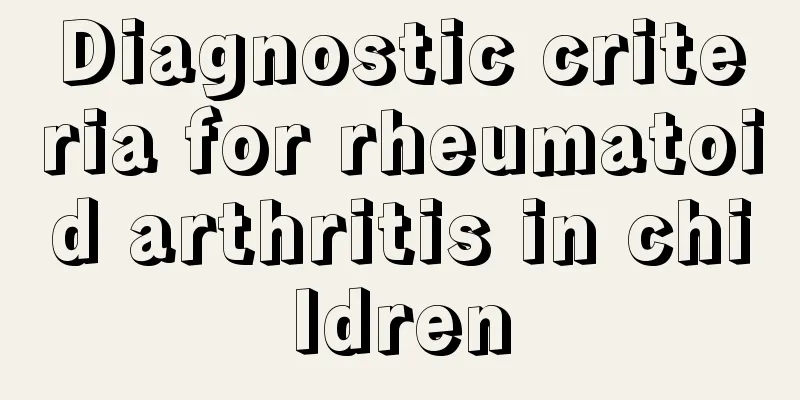Diagnostic criteria for rheumatoid arthritis in children

|
We usually know that rheumatic diseases mostly occur in adults or the elderly. In fact, children may also develop rheumatoid diseases. There are many diagnostic criteria for rheumatoid arthritis in children. Children's joints are not fully developed and are relatively weak. We can observe whether there are deformities in the finger joints, or detect whether the lymph nodes are blocked. X-rays can be used to detect the internal structure of the body for diagnosis. The following will introduce you to the diagnostic criteria. If children have long-term, persistent, symmetrical polyarthritis, mainly affecting small joints, which eventually leads to typical symptoms of joint deformity, it is generally not difficult to diagnose. However, the systemic type is more common in children, especially in young children who may only have fever without obvious joint symptoms, and are easily misdiagnosed. Therefore, if there is long-term intermittent fever, transient polymorphic rash, hepatosplenomegaly and lymphadenopathy, and an increased white blood cell count, but no infection lesions can be found, this disease should be considered. If the child is found to have joint stiffness in the morning and the symptoms are alleviated after more activities, it can help with diagnosis. Further laboratory tests and bone and joint X-ray examinations should be performed to confirm the diagnosis. Rheumatoid arthritis is not just a disease for adults; many children also suffer from the disease. Arthritis in children is called juvenile rheumatoid arthritis in the United States and chronic arthritis in children in the United Kingdom and Europe. Juvenile rheumatoid arthritis is one of the most common chronic diseases in childhood and the leading cause of blindness. Occasionally, a short acute attack is followed by complete recovery. In a few children, the symptoms disappear after an acute phase of 2 to 3 years without any sequelae. In most children, joint symptoms alternate between relief and relapse, sometimes mild and sometimes severe. Sometimes the disease can recur even after it has subsided for many years. 1. Tuberculous arthritis is mostly monoarthritis, with a positive tuberculin test and symptoms of tuberculosis poisoning, and often tuberculosis lesions in other parts of the body. X-ray examination showed bone destruction as the main feature. 2. Suppurative arthritis is mostly monoarthritis, with an acute onset and obvious symptoms of poisoning. The joints are extremely red, swollen, hot and painful, and the total white blood cell count and neutrophil count are increased. 3. Rheumatic fever joint pain is mostly migratory, mainly in large joints. Joint dysfunction only occurs in the acute phase, without leaving behind joint stiffness and deformity, and often with symptoms of carditis. During the active phase, the erythrocyte sedimentation rate and antistreptolysin "O" titer increase. Joint X-rays usually show no abnormalities. 4. In addition to fever and joint pain, systemic lupus erythematosus also has a butterfly-shaped rash on the face, carditis and kidney damage. "Lupus cells" may be found in blood or bone marrow smears. The total white blood cell count decreased, the neutrophil count increased relatively, and the eosinophil count decreased. 5. Ankylosing spondylitis is more common in young people over six years old and adults. The large joints (knees, feet, shoulders, hips) may feel hot, swollen, and painful, and the pain is severe late at night, but it is characterized by limited spinal movement, initially in the lumbar spine, followed by the thoracic and cervical spine. |
<<: Children's body itchy when sleeping at night
>>: What to do if your child has eczema
Recommend
The reason why children's palms are hot
Hot palms are a common phenomenon nowadays, becau...
How to deal with a frightened child
When a child is born, he or she is curious about ...
How to treat baby’s fever?
Catching a cold and having a fever are the most c...
Developmental characteristics of girls at different stages
For a girl, different characteristics will contin...
Treatment for chest tightness and shortness of breath in children
There are many reasons why children experience ch...
What should I do if my baby's gums are red, swollen and bleeding? Parents should reflect on themselves.
Children’s teeth are always fragile. Sometimes, f...
Symptoms of convulsions in two-month-old babies
Every change in the baby after birth is watched b...
What are the retinal examination items for premature infants?
Pregnant women nowadays do not pay attention to t...
How old is it good for children to drink milk?
It is good for children to drink milk regularly b...
What should children eat to improve their memory?
People say that food is the first necessity of th...
What to do if a little boy has a long foreskin
Now more and more parents are beginning to pay at...
What to do if your child has convulsions
Many parents will find that their children have c...
What should I do if my baby’s foreskin is too long?
Some mothers wrote to us and said that their baby...
What should I do if my child’s face becomes red and itchy due to allergies?
Compared with adults, children have weaker resist...
Dietary taboos for children with bronchial asthma
I believe that all parents hope that their childr...









